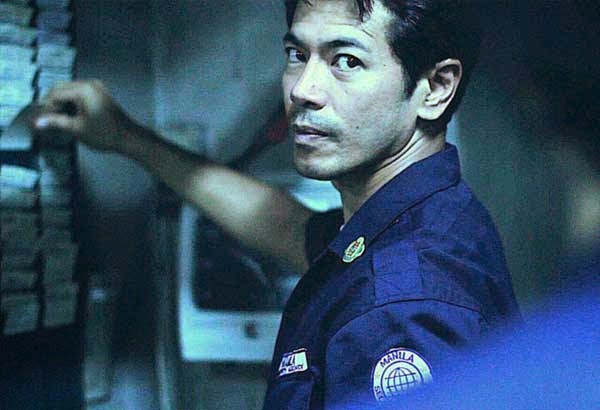A mad gaze.
For the sake of posterity, I will dare state that this is my first
Thomas Vinterberg film (it has always been all Lars von Trier for me), and
though I'm not yet fully familiar with his style as a whole, I think it's
already fair enough to believe that his polished visual approach for this one is
already many years removed from his Dogme 95 roots. But what "The
Hunt" lacks in showcasing its director's cinematic trademarks it more than
makes up in its intense exploration of everything morally gray. There has been
this widely held belief that the things children say are almost always true.
Although "The Hunt", even in itself, can't dispute this very fact,
what it really wants to say is that once a rare white lie comes out of a kid's mouth,
that of which involves you as the make-believe perpetrator of an abhorrent deed,
prepare for hell.
Set in a sleepy town populated by people who know each other like
family, "The Hunt" is as innocuous as any film can be. And to add yet
another dose of harmlessness to this calm and collected scenario, it stars Mads
Mikkelsen as a kindergarten teacher named Lucas who does nothing all day but
play with his diminutive students. Among the kids is a cute girl named Klara (Annika
Wedderkopp), daughter of Lucas' best friend Theo (Thomas Bo Larsen), who is as
mysterious as she is irresistibly adorable. Lucas often walks her to school,
and Theo does not seem to mind. One day, though, after Klara inexplicably
kissed Lucas in the lips and was subsequently rejected, she then unexpectedly concocted
a story detailing how Lucas has shown her his 'willie' and then proceeded to
molest her. Shocked and distressed, the school's principal and also the entire
community, without even thinking twice, immediately turned their back on poor
Lucas.
Ostracized and alone, Lucas, aside from being socially banished from the
town he grew up in, also becomes a victim of mass hysteria that he never could
have foreseen. Slowly, even the boys who he often plays with in the playground
start to craft their own anecdotes of how they were sexually abused by Lucas,
even going as far as vividly describing the minute details of their teacher's
rustic household. Like a more infuriating, teeth-gnashing small town version of
"Rashomon", "The Hunt" is an even trickier film about
subjectivity and perception mainly because the bending of facts comes from
innocent children who do not even have any stake on anything. If nothing else,
it is a grating essay on how a person's deeply-held beliefs about perception
can destroy the life of another. Who said innocence is bliss?
Mads Mikkelsen, who most of us will recognize as Le Chiffre in Daniel
Craig's very first Bond outing, is utterly believable as a mild-mannered
teacher who, in some ways, is content in living a very simple life. Though one
must only look at his face to realize that he's the perfect actor to play any
psychotic character (hence why he was cast as Hannibal Lecter in the on-going
TV series), Mikkelsen has still made me believe in this film that he can play a
wronged everyman in such a way that you will back him fully no matter what he
does, ala Dustin Hoffman in "Straw Dogs". And yes, this may be
far-fetched, but I believe "The Hunt", as much as it is a quiet drama
film, has borrowed elements from the western genre, specifically on how Mikkelsen's
nursery teacher role closely mirrors the brash town outsiders guys like Clint
Eastwood have played in countless gun-toting films in the past, but without the oozing bravado. And as with all western films, it is but necessary for the
'wronged outsider' to prove that he's worth the ounce of respect that his
co-villagers owe him. Lucas may not be a gunslinger (well, his affinity for
hunting does not count) in the mythical sense of the word, but he treads such a
path towards vindication just the same.
If the film portrays, in detail,
how easy it is be put in utter disgrace based solely on a baseless accusation,
it also deeply shows the difficulty of reclaiming respect after losing it
overnight. Lucas learned it the hard way, and although it's easy to make amends
with people, it is hard to re-tie the knot that was already severed. The film
is by no means a thriller, but how it unfolds really does flirt with the
conventions of the genre. There's also a certain kind of emotional impact in
the film that makes it just as powerful a depiction of incorrect indictment as
"Dancer in the Dark", which is coincidentally a film directed by Vinterberg's
Dogme 95 co-pioneer, Lars von Trier.
"The Hunt", as with all slow-moving drama films of its kind,
requires a considerable amount of patience. But at the same time, the film is
also borderline humorous in its intense elicitation of anger that it almost literally
asks for us viewers to control our collective fury as we watch Lucas' bleak
attempt to prove everyone his innocence unravel in all its futility. As
frustratingly polished as "The Hunt" may be for a film directed by a
Dogme 95 luminary, its themes are still fairly consistent to the said film
movement's loose collective intention to explore isolation and moral ambiguity
in claustrophobic social settings. There is pure power hiding beneath the
film's seemingly plain nature, and it will suck you in until you can only look
at a lie, no matter how harmless and white, whether by a sickly octogenarian or
a naïve child, as something that truly destroys.
FINAL RATING











